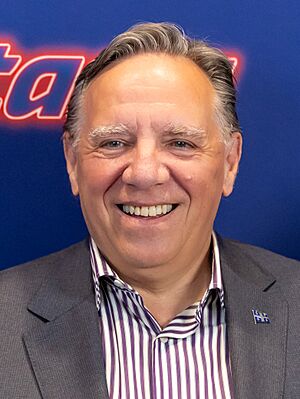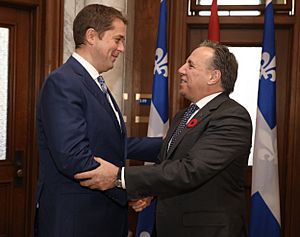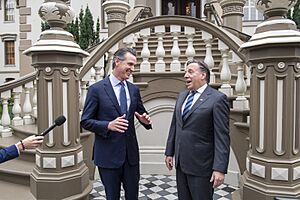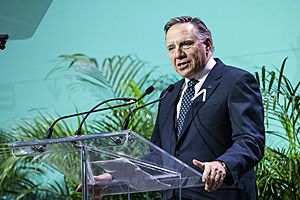François Legault facts for kids
Quick facts for kids
François Legault
MNA
|
|||||||||||||||||||||||||
|---|---|---|---|---|---|---|---|---|---|---|---|---|---|---|---|---|---|---|---|---|---|---|---|---|---|

Legault in 2024
|
|||||||||||||||||||||||||
| 32nd Premier of Quebec | |||||||||||||||||||||||||
| Assumed office October 18, 2018 |
|||||||||||||||||||||||||
| Monarch | |||||||||||||||||||||||||
| Lieutenant Governor |
|
||||||||||||||||||||||||
| Deputy | Geneviève Guilbault | ||||||||||||||||||||||||
| Preceded by | Philippe Couillard | ||||||||||||||||||||||||
| Leader of the Coalition Avenir Québec | |||||||||||||||||||||||||
| Assumed office November 4, 2011 |
|||||||||||||||||||||||||
| President | Dominique Anglade Maud Cohen Stéphane Le Bouyonnec Sarah Beaumier |
||||||||||||||||||||||||
| Preceded by | Position established | ||||||||||||||||||||||||
|
|||||||||||||||||||||||||
|
|||||||||||||||||||||||||
| Personal details | |||||||||||||||||||||||||
| Born | May 26, 1957 Lachine, Quebec, Canada |
||||||||||||||||||||||||
| Political party | Coalition Avenir Québec (since 2011) | ||||||||||||||||||||||||
| Other political affiliations |
Parti Québécois (1998–2009) |
||||||||||||||||||||||||
| Spouse |
Isabelle Brais
(m. 1992) |
||||||||||||||||||||||||
| Children | 2 | ||||||||||||||||||||||||
| Residence | Édifice Price | ||||||||||||||||||||||||
| Alma mater | HEC Montréal (BBA, MBA) | ||||||||||||||||||||||||
| Occupation |
|
||||||||||||||||||||||||
François Legault (born May 26, 1957) is a Canadian politician. He has been the 32nd premier of Quebec since 2018. The premier is like the head of the government for the province of Quebec.
Legault is a founding member of the Coalition Avenir Québec (CAQ) political party. He has been the leader of this party since it started in 2011. He is also a member of the National Assembly (MNA) for the area called L'Assomption.
Before becoming a politician, he helped start a Canadian airline called Air Transat. He was an MNA from 1998 to 2009. During that time, he served as the Minister of Education and Minister of Health. He was first elected as a member of the Parti Québécois (PQ). He left politics for a short time in 2009. He returned in 2012 when he was elected as an MNA for L'Assomption.
Legault led the CAQ to win the provincial elections in 2018 and 2022. This was the first time in many years that a government not from the Quebec Liberal Party or the Parti Québécois was in power.
Contents
Early Life and School
François Legault was born on May 26, 1957, in Lachine, Quebec. He grew up in Sainte-Anne-de-Bellevue, Quebec. His father, Lucien Legault, worked as a postmaster. His mother, Pauline Schetagne, was a housewife and also worked as a cashier.
Legault studied at HEC Montréal. He earned a bachelor's and a master's degree in business administration. He is also a member of the Canadian Institute of Chartered Accountants, which means he is a qualified accountant.
Business Career
Before entering politics, Legault worked in business. He was an administrator for a company called Provigo. He also worked as an auditor for Ernst & Young until 1984.
In 1985, Legault became the director of finance for Nationair Canada. Later, he was the marketing director at Quebecair. In 1986, he helped start Air Transat. He was the chief executive officer (CEO) of Air Transat until 1997. Air Transat quickly became one of Canada's largest airlines for charter flights.
Political Journey
Joining the Parti Québécois
Lucien Bouchard encouraged Legault to enter politics. In the 1998 election, Legault was elected to the National Assembly for the area of Rousseau. He quickly became a minister, first for industry and commerce, then for education.
When Lucien Bouchard stepped down, Legault supported Bernard Landry. Landry then appointed Legault as Minister of Education and later as Minister of Health and Social Services. Legault was re-elected in 2003. He continued to work on economic and financial issues for his party.
In 2009, Legault announced he would leave politics. Many people thought he might become a party leader in the future.
Starting the Coalition Avenir Québec
In February 2011, Legault started a new political group with Charles Sirois. It was called the "Coalition pour l'avenir du Québec." In November 2011, it became an official political party named the Coalition Avenir Québec (CAQ).
The CAQ wanted to bring together voters who shared similar ideas, no matter their views on Quebec becoming a separate country. Legault, who had once supported Quebec independence, changed his mind. He promised that a CAQ government would never hold a vote on Quebec's independence. He believed that the long debate about independence had slowed down Quebec's economy. He founded the CAQ to focus on improving the economy first.
In the 2012 election, the CAQ came in third place, winning 19 seats. Legault was elected as the MNA for L'Assomption. In the 2014 election, the CAQ again finished third but won more seats, reaching 22.
In the 2018 election, Legault led the CAQ to a big win. They gained 53 seats, reaching a total of 74. This meant the CAQ formed a majority government, and Legault became the premier of Quebec. This was a historic moment, as it was the first time in 48 years that the government was not from the Liberal Party or the Parti Québécois.
Legault led the CAQ to another majority win in the 2022 election. His party gained even more seats.
Premier of Quebec (2018–Present)

On October 18, 2018, Legault officially became the Premier of Quebec. This marked the end of nearly 50 years of rule by either the Liberal or Parti Québécois parties.
Rules on Religious Symbols
During the 2018 election, Legault's party promised to create a law about religious symbols. On March 28, 2019, the Quebec government introduced Bill 21. This bill aimed to stop public workers in positions of authority from wearing religious symbols. This included police officers, judges, and teachers.
The bill used a special rule called the notwithstanding clause. This rule helps prevent laws from being overturned by courts. The bill passed on June 17, 2019. Legault said the law was fair and would help prevent extreme political views in Quebec. The bill was renewed for five more years in May 2024.
Immigration Policies
François Legault has spoken about immigration in Quebec. He has linked immigration to concerns about "violence" and "extremism." He also worried about the impact of non-French speakers on Quebec's "national cohesion." Legault later apologized for some of his comments.
Experts have different views on the topic. Some say that limiting immigration too much could cause problems and lead to negative feelings towards immigrants. Others suggest that negative reactions against immigrants might come from feelings of insecurity among people who are not immigrants.
Human rights groups have expressed concern about some statements made by Legault's government. They believe these statements create anxiety by blaming immigrants for problems in public services.
Under Legault's government, the number of immigrants allowed into Quebec was reduced to 40,000 in 2019. In 2019, a values test was also introduced for immigrants. There have been challenges with family reunification, where many cases are waiting to be processed.
In 2019, Legault said he wanted more French and other European immigrants to come to Quebec. In August 2019, he told businesses that if they wanted more workers, they should offer higher wages.
In June 2022, Legault stated he was against multiculturalism. He supports interculturalism and integration. This means he believes immigrants should learn French and fit into Quebec society. In 2022 and 2024, Legault suggested Quebec might hold a referendum to get more control over immigration from the federal government.
Language Laws
In May 2022, Legault's government passed Bill 96. This bill strengthens the 1970s Charter of the French Language. It aims to protect and promote the French language in Quebec.
Legault caused some discussion when he said that Quebec risked losing French as an official language. He believed this could happen if Quebec did not have more control over immigration. He compared it to the U.S. state of Louisiana, where French was once widely spoken.
Apology to Indigenous Peoples
In October 2019, Legault apologized to First Nations and Inuit peoples. He apologized for the discrimination they had faced from the government. He said that the Government of Quebec had not done enough to help them. He also noted that apologies are just a first step, and more work is needed to fix long-standing problems.
Response to COVID-19
During the COVID-19 pandemic in 2020, Legault held daily press conferences. He encouraged people to stay home and follow hygiene rules to stop the virus from spreading.
Environmental Goals
In November 2020, Legault announced a plan to fight climate change. This plan included banning the sale of new gas-powered cars from 2035. However, commercial vehicles and used cars would still be allowed. Some experts suggested that more money should go to public transportation and other ways to reduce climate change.
Changes in Education
The Legault government passed Bill 40 on February 8, 2020. This bill changed how French school boards in the province were run. They became "school service centres."
This bill did not include the nine English school boards. However, some people saw this change as weakening English-language education in Quebec.

In April 2022, Legault's government introduced Bill 32. This bill was about Academic freedom in universities. The bill passed in June 2022.
Supporting Local Businesses
Legault and his government have promoted a "buy local" campaign. In early 2020, his government created an online directory called Le Panier Bleu (The Blue Basket). This website lists local Quebec retailers. The goal of Le Panier Bleu is to be a local version of Amazon to sell Quebec products. Legault supported the idea of a Quebec version of Amazon as a way to help local businesses.
Labour Relations
In December 2023, half a million public sector workers in Quebec went on strike. The provincial government aimed to reach an agreement with the unions before 2024.
Pro-Palestinian Protests
In May 2024, Legault spoke out against pro-Palestinian protests on university campuses. He said that police should remove an "illegal" pro-Palestinian camp at Montreal’s McGill University.
Personal Life
Legault married Isabelle Brais on March 7, 1992, in Mont-Saint-Hilaire, Quebec. They have two children. Legault is Catholic.
Awards and Honours
Since 2000, Legault has been a Fellow of the Ordre des comptables agréés du Québec. This is an honour given to chartered accountants in Quebec.
Images for kids
-
Andrew Scheer with Legault in 2018
-
Legault with California Governor Gavin Newsom in Sacramento, December 2019
See also
 In Spanish: François Legault para niños
In Spanish: François Legault para niños
 | John T. Biggers |
 | Thomas Blackshear |
 | Mark Bradford |
 | Beverly Buchanan |






